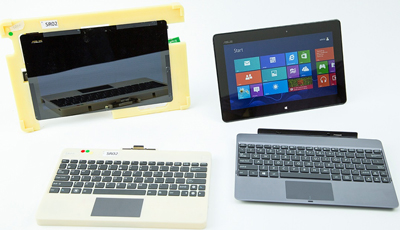Windows RT Devices Coming from Dell, Lenovo and Samsung
Dell, Lenovo and Samsung will be releasing devices for the Windows RT operating system, a Microsoft official confirmed Monday.
Windows RT is the version of Windows 8 designed for system-on-a-chip (SoC) platforms, especially consumer tablets. Higher-end tablets designed to be backward compatible with older Windows applications for business and power user purposes will have x86 processors and run Windows 8. Windows RT and Windows 8 have both been released to manufacturing.
Microsoft had previously committed to releasing a Microsoft Surface tablet running Windows RT on Oct. 26, when Windows 8 and Windows RT hit general availability. ASUS had also previously announced a Windows RT-based system.
"If you are following Windows RT, perhaps you have taken note of the Asus Tablet 600 (Windows RT) announcement or Microsoft's own Surface RT news. Along with Asus, we are excited to share that there will be ARM-based PC designs from Dell, Lenovo, and Samsung running Windows RT," wrote Mike Angiulo, vice president of Microsoft's Windows Ecosystem and Planning team, in a blog post.
Angiulo said more announcements for more form factors on both operating systems would be coming as the launch approached.
"Windows RT is not just for tablet form factors. Some of our Windows RT PCs come with full keyboard and touchpad solutions, whether removable/dockable or a traditional clamshell," he said.

[Click on image for larger view.]
|
| Two images of ASUS' Windows RT tablet show the evolution from a prototype to its final design. (Source: Microsoft Corp.) |
Given the limited number of Windows RT form factors that Microsoft is licensing, it was interesting that Angiulo's post didn't make note of two Windows RT devices Toshiba announced at Computex, a clamshell and a tablet. Other notable omissions from the larger group of device makers are Acer and HP.
Acer's CEO and Chairman J.T. Wang has been publicly critical of Microsoft's handling of OEMs prior to the Windows 8/RT launch. HP has gone on record, in the form of an anonymous spokesperson's statement, that it would develop an x86/Windows 8 tablet before a Windows RT/ARM-based device. However, other recent reports suggest HP may be reconsidering.
Angiulo also noted that Microsoft has avoided a forked code situation with Windows RT in spite of the many SoC platforms involved: "We have achieved our goal of one Windows binary for all Windows RT SoC platforms from NVIDIA, Qualcomm, and Texas Instruments, each of which has developed innovative ARM CPUs that form the basis of a complete system."
Related:
Posted by Scott Bekker on August 13, 2012